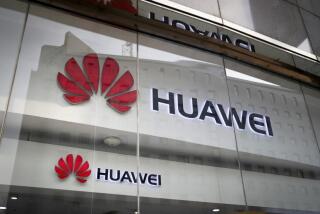Hitachi Plans to Raise U.S. Purchases : Will Buy High-Tech Products, Build New Plant in This Country
- Share via
WASHINGTON — Hitachi, the Japanese electronics company, said Wednesday that it will spend $120 million to buy U.S. semiconductors and other high-tech products by the end of 1986 and announced plans for a new production facility in the United States.
Toshi Kitamura, executive managing director of Hitachi’s international operations group, said his company will send a team to the United States in about two weeks “to identify suppliers and negotiate contracts” for American products to be exported to Japan.
“We feel it is essential that we strengthen and expand our relationship with the U.S.,” Kitamura said.
He told a news conference that Hitachi’s purchases would include semiconductors, communications and research and development equipment and other products. But he declined to say what part of the $120 million would be spent on specific items.
‘Very Small Step’
In response, an official of a U.S. trade group said he welcomes any efforts that would give American companies more opportunity to sell their products overseas.
“It’s a very small step,” Mark V. Rosenker, a spokesman for the Electronic Industries Assn., said of Hitachi’s plan. “But it’s critical to have a beginning.”
The Hitachi announcement followed Japan’s unveiling Tuesday of a three-year plan to curb its huge trade surpluses and expand imports. Japan’s decision follows sharp criticism of its import policies and a growing movement in Congress for some type of protectionist trade legislation.
Analysts have predicted that the U.S. trade deficit with Japan--which totaled nearly $4.6 billion in June--may reach $50 billion this year.
Hitachi has figured recently in complaints by U.S. semiconductor makers, who have petitioned the Reagan Administration to take steps to force Japan to open its microchip markets to imports. The petition named Hitachi and five other companies. And U.S. trade officials in June criticized a memo from Hitachi urging its distributors to undercut competitors’ prices. Hitachi countered that the memo had not been authorized.
Kitamura said Hitachi, with annual sales of $2.7 billion, welcomed the steps by the Japanese government, “which will enable American companies to enjoy the same access to Japan which Japanese companies enjoy in the United States.”
“We would like to have less tensions between these two countries,” he added.
However, Kitamura said Hitachi’s decision to add $120 million to the $260 million that it now spends annually on American products was made without any input from the Japanese government. “We are acting independently of our government,” he declared.
The company now employs 3,655 in the United States, most of them Americans. It has 10 U.S. manufacturing plants, including five in California, that produce items ranging from color television sets and semiconductors to circuit breakers and audio tapes and videotapes.
Company officials said they would announce the site of the new U.S. facility soon but declined to specify what it would produce.
Kitamura, conducting the news conference in English and occasionally cooling himself with a small hand-held fan, said his company has no plans at this time for any major corporate acquisitions in this country. “I am not looking at any right now,” he said.
Hitachi officials also said the company is not interested in any joint ventures with American investors, preferring instead to set up its own factories.
In addition to its purchases and the new facility, Hitachi also said it would contribute $20 million to set up a foundation to support joint educational research projects, scholarships and cultural and charitable programs in the United States.
“The U.S.-Japan relationship is based on far more than business,” Kitamura said. “Our cultures have become intertwined in many ways, from baseball and Coke to sushi bars and VCRs.”





